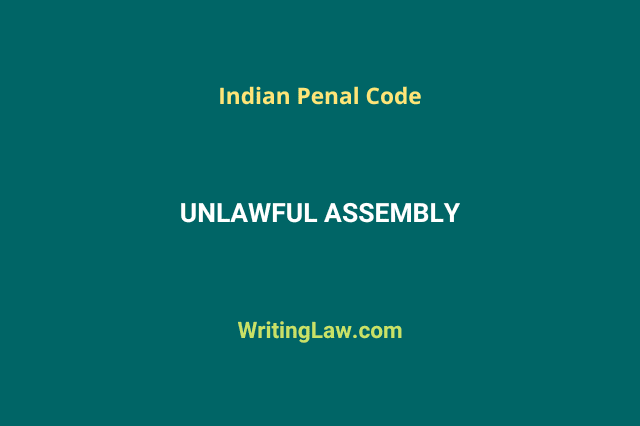
A civilised society cannot exist without peace. To maintain public peace and order in India, the Indian Penal Code criminalises the formation of unlawful assembly. Section 141 to section 145 of the IPC deals with the provisions related to unlawful assembly.
In this law article, you will read about the meaning of unlawful assembly and the provisions of unlawful assembly under the Indian Penal Code, 1860.
A Bit of Background
In ancient times, the mere gathering or assembly of people was considered a threat to society and thus illegal. However, with the development of a democratic society, the assembly of people became a public necessity.
Any assembly or gathering cannot be punished unless it is for an unlawful purpose. Therefore, defining the objects that make an assembly unlawful becomes necessary. The main reason for criminalising unlawful assembly is to maintain public peace and order.
To prevent people from committing crimes in groups or by making an assembly, the Indian Penal Code declares assembly for unlawful purposes as unlawful assembly and provides punishment for it.
What Is Unlawful Assembly?
Unlawful assembly is defined under section 141 of the IPC. According to this section, any assembly is unlawful if its common objective is to:
- Overpower the government (central as well as state government), the legislature (central as well as state legislature) or any public servant in the exercise of lawful power by using criminal force.
- Resist or oppose the application of the law or any legal process.
- Commit mischief, criminal trespass or any other offence.
- Obtain possession of any property or deprive any person of their incorporated right by using criminal force.
- To force someone to commit a crime or any said illegal act.
However, for an assembly to be referred to as an unlawful assembly, there must be five or more persons in the assembly, and they must constitute a common object. This means that all the persons of the assembly must be aware of the object of the formation of such assembly. The mere presence of any person does not make that person a member of the unlawful assembly.
An assembly that is lawful at its commencement/beginning can develop into an unlawful assembly (by subsequent acts of the members).
Punishment for Being a Member of an Unlawful Assembly
Section 142 of the IPC provides that if a person continues to be in an unlawful assembly after knowing it is illegal, he is considered a member of that unlawful assembly.
Members of the unlawful assembly must be liable for the punishment provided under section 143 of the Indian Penal Code. Section 143 of the IPC states that members of the unlawful assembly must be punished with imprisonment of not more than six months, a fine, or both.
Punishment for Joining Unlawful Assembly Armed With Deadly Weapons
Section 144 of the IPC provides punishment for being a member of an unlawful assembly that is armed with weapons that can likely cause death. This section is an aggravated form of section 143 of the IPC.
According to section 144 of the IPC, members of an unlawful assembly armed with any deadly weapon or weapon likely to cause death are liable to punishment with imprisonment of not more than two years, a fine, or both.
Punishment for Joining or Being a Part of Unlawful Assembly Knowing It Has Been Dispersed
Section 145 of the Indian Penal Code provides punishment for not obeying the lawful order promulgated by a public servant. According to this section, any person who either joins or continues to stay in an unlawful assembly after knowing that an order to disperse the assembly has been given – is liable for punishment of imprisonment for not more than two years, a fine, or both.
Read Next:
1. Understanding Section 34 and Section 149 of IPC
2. 6 Differences Between Rioting and Affray
- Understanding the Legislative Branch of the Indian Government - 6th May 2024
- Appointment, Oath, and Removal of Constitutional Posts in India - 28th April 2024
- Powers of Income Tax Authorities in India - 26th April 2024







